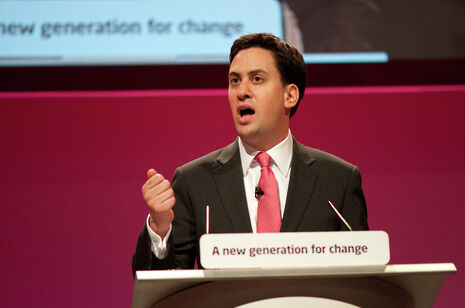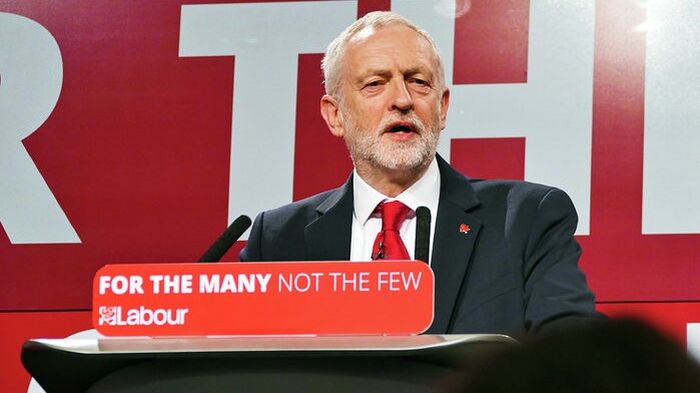Corbyn didn’t kill New Labour, Miliband did
Challenging the traditional version of events, Noah Froud argues that it was Ed Miliband who truly established Labour as a party which stood against the status quo

When Corbyn took over the leadership of the Labour Party in 2015, everything changed. Two decades of Blairite New Labour orthodoxy were finally over. The left, and their ideas, returned from the wilderness to reclaim the party from centrists.
This, at least, is the conventional narrative. But it is a myth that both Corbyn supporters and Corbyn-sceptics perpetuate. Ironically, it serves both sides’ interests. For Corbyn’s supporters, it builds up Corbyn as the man who changed Labour and ended the party’s acceptance of ‘neoliberalism’. For Corbyn’s enemies, it helps them cast him as an outsider, an aberration, to Labour’s traditions.
But this myth is just that. It ignores the realities of the party’s recent history and the critical years between 2010 and 2015. These years, under Ed Miliband, were crucial. Labour started to transform from a party obsessed with claiming the median voter to one which represented a fundamental challenge to the status quo. Corbyn did not kill New Labour; it died as soon as Miliband won the leadership.
“The continuities between Corbyn and Miliband show Labour does not face a choice between a Corbyn or a Tony Blair clone”
Three key trends which started under Miliband continued under Corbyn. First, the consolidation of Labour as a party championing popular policies against the current orthodoxies. Miliband talked of the need to “reform capitalism” in the aftermath of the financial crisis, believing the system was structurally flawed. With the policies like the freeze on energy prices, Labour channelled popular frustration with markets. This didn’t just happen in economics; Miliband blocked intervention in Syria, reflecting public opposition to another rushed military escapade.
Second, Miliband began the process of building the Labour Party into a movement. He was always going to struggle to complete this given that he is not a ‘movement politician’ in the same way that Corbyn is. Yet Miliband’s implementation of the Collins review’s recommendations dramatically democratised the party by ensuring the leadership was directly responsive to the movement’s members.
Third, Miliband positioned Labour as an ‘anti-establishment’ party, unafraid to take on entrenched interests. This went beyond pushing policy that fell outside the ‘Overton window’ of acceptable policy. For example, Miliband engaged in outright confrontation with the Murdoch media empire, calling Mudroch’s bid for BSkyB “untenable” in light of the phone-hacking scandal. For this, he earned unceasing hostility from the Murdoch press.
All of these positions, and the rhetoric that went with them, were a major break with the policies and politics of New Labour.
Corbyn is an exaggeration of these trends: whereas Miliband was wary of Western military intervention, Corbyn opposes it outright; Miliband would have allowed the state to bid for rail franchises, Corbyn would nationalise rail totally; Miliband promised to lower tuition fees, Corbyn promised to scrap them. Yes, Corbyn has gone further, but to claim the departure from New Labour and its acceptance of the ‘Thatcherite’ orthodoxy came only with him is plainly wrong. Miliband is also closer to Corbyn than these points might suggest. It’s generally believed Miliband was prevented from moving further left by his cabinet and an unconvincing mandate for the leadership.
What then, is genuinely new about Corbyn? It’s not so much Corbyn’s degree of leftism but his type of leftism. It’s a left which combines an anti-Western foreign policy with a tendency to tolerate or be blind to anti-Semitism. On the first point, Corbyn’s spin doctor Seamus Milne has been frequently criticised as an ‘apologist’ for Putin; it would have been unimaginable for Miliband to hire Milne. Nor would he ever have (accidentally or wilfully) defended an anti-Semitic mural as Corbyn has.
In some senses then, Corbyn is a break with the past, but not in the way his supporters would like to imagine. The continuities between Corbyn and Miliband show Labour does not face a choice between a Corbyn or a Tony Blair clone. Ironically, those who argue there is a massive amount of space between Corbyn and ‘Red Tory’ Blair refuse to admit that any Labour politician actually exists in that space. This is what makes the unflinching support of Corbyn by so many, despite his failure on issues like anti-Semitism, so outrageous. Tolerating failures like these because he represents a left-wing agenda is not only morally unacceptable, it’s illogical. There are many Labour figures who back the programme laid down in the 2017 manifesto wholeheartedly. Ultimately, if we want a transformative Labour government, they, and not Corbyn, are our best bet.
 News / Caius mourns its tree-mendous loss23 December 2025
News / Caius mourns its tree-mendous loss23 December 2025 Comment / Yes, I’m brown – but I have more important things to say22 December 2025
Comment / Yes, I’m brown – but I have more important things to say22 December 2025 News / Cambridge welcomes UK rejoining the Erasmus scheme20 December 2025
News / Cambridge welcomes UK rejoining the Erasmus scheme20 December 2025 News / CUP announces funding scheme for under-represented academics19 December 2025
News / CUP announces funding scheme for under-represented academics19 December 2025 Interviews / Politics, your own way: Tilly Middlehurst on speaking out21 December 2025
Interviews / Politics, your own way: Tilly Middlehurst on speaking out21 December 2025










